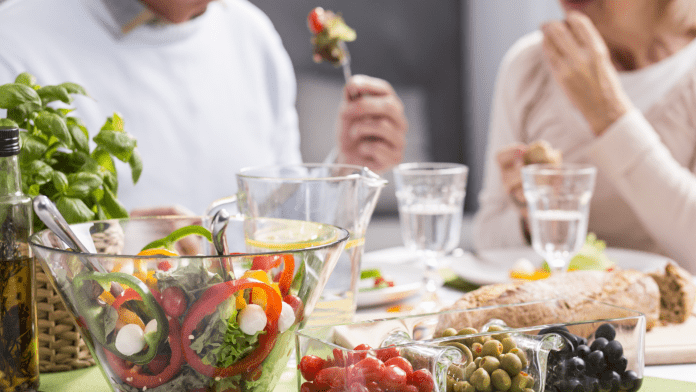As the monsoon season arrives, it brings with it the risk of various illnesses and infections due to increased humidity and dampness. This poses a significant challenge to the elderly population, whose immune systems may not be as robust as they once were. To combat these challenges and ensure a healthy monsoon, it is essential for the elderly to follow a well-balanced and nutrient-rich diet plan that can supercharge their immunity. In this article, we will explore an Indian diet plan specially designed for the elderly to help them stay strong, healthy, and protected during the monsoon season.
Importance of a Well-Balanced Diet for the Elderly:
The immune system tends to weaken with age, making the elderly more susceptible to infections and illnesses. A well-balanced diet plays a crucial role in supporting and enhancing the immune response. Nutrients like vitamins, minerals, antioxidants, and protein are essential for maintaining a strong immune system. Additionally, a diet rich in nutrients can help manage chronic health conditions and provide the necessary energy and vitality required during this rainy season.
Components of the Indian Diet Plan for the Elderly:
1. Seasonal Fruits and Vegetables
Including a variety of seasonal fruits and vegetables in the diet is essential during the monsoon. Fruits like pomegranates, oranges, apples, and guavas are rich in vitamin C, which can boost immunity. Vegetables like spinach, broccoli, carrots, and bell peppers provide vitamins and minerals that support overall health. These foods are also rich in antioxidants, which help protect the body from oxidative stress and improve immunity.
2. Whole Grains
Whole grains like brown rice, quinoa, millets, and oats are a great source of fiber and complex carbohydrates. They aid in digestion, regulate blood sugar levels, and provide a sustained release of energy throughout the day. Whole grains also contain essential nutrients like B vitamins, iron, and zinc, which are vital for immune function.
3. Protein-Rich Foods
Protein is the building block of the immune system and plays a crucial role in repairing tissues and fighting infections. The elderly should include protein-rich foods in their diet, such as lentils, beans, chickpeas, tofu, fish, and lean meats. Vegetarian sources of protein are particularly important for those who follow a plant-based diet.
4. Healthy Fats
Incorporating healthy fats in the form of nuts, seeds, avocados, and olive oil can help in the absorption of fat-soluble vitamins like A, D, E, and K. These vitamins are essential for immune function and overall health. Omega-3 fatty acids found in fatty fish, flaxseeds, and walnuts have anti-inflammatory properties, which can benefit the elderly by reducing the risk of chronic diseases.
5. Probiotics
The gut plays a significant role in supporting the immune system. Including probiotic-rich foods like yogurt, kefir, and fermented vegetables can help maintain a healthy gut microbiome, which in turn can boost immunity and improve digestive health.
6. Hydration
Staying hydrated is essential during the monsoon, as the risk of dehydration remains high. Adequate water intake helps flush out toxins, supports digestion, and maintains overall health. Herbal teas, infused water, and coconut water are excellent options to stay hydrated and add extra nutrients to the diet.
7. Spices and Herbs
Indian spices like turmeric, ginger, garlic, and black pepper have antimicrobial and anti-inflammatory properties that can strengthen the immune system. Including these spices in daily cooking not only enhances the flavor of the dishes but also provides health benefits.
Sample Indian Diet Plan for the Elderly During Monsoon:
Below is a sample diet plan that can be followed by the elderly during the monsoon season:
Breakfast:
- Vegetable poha (beaten rice) with peas, carrots, and turmeric
- A small bowl of curd with a pinch of black pepper
Mid-morning Snack:
- A handful of mixed nuts (almonds, walnuts, and cashews)
Lunch:
- Brown rice with lentil curry (dal) and a side of mixed vegetable curry
- A fresh cucumber and tomato salad with a sprinkle of lemon juice
Afternoon Snack:
- A fruit bowl with seasonal fruits like papaya, watermelon, and kiwi
Evening:
- Herbal tea with ginger and tulsi (holy basil)
Dinner:
- Grilled fish or tofu with steamed broccoli and quinoa
- A small bowl of vegetable raita (yogurt with cucumber, mint, and cumin)
Final Thoughts:
Taking care of the elderly’s health during the monsoon season is of utmost importance. A well-balanced Indian diet plan, comprising seasonal fruits and vegetables, whole grains, protein-rich foods, healthy fats, probiotics, and immune-boosting spices, can supercharge their immunity and protect them from common infections and illnesses. Additionally, staying hydrated and following a regular exercise routine can further enhance their overall well-being. By adopting these dietary guidelines and maintaining a healthy lifestyle, the elderly can make the most of the monsoon season while safeguarding their health and immunity.





